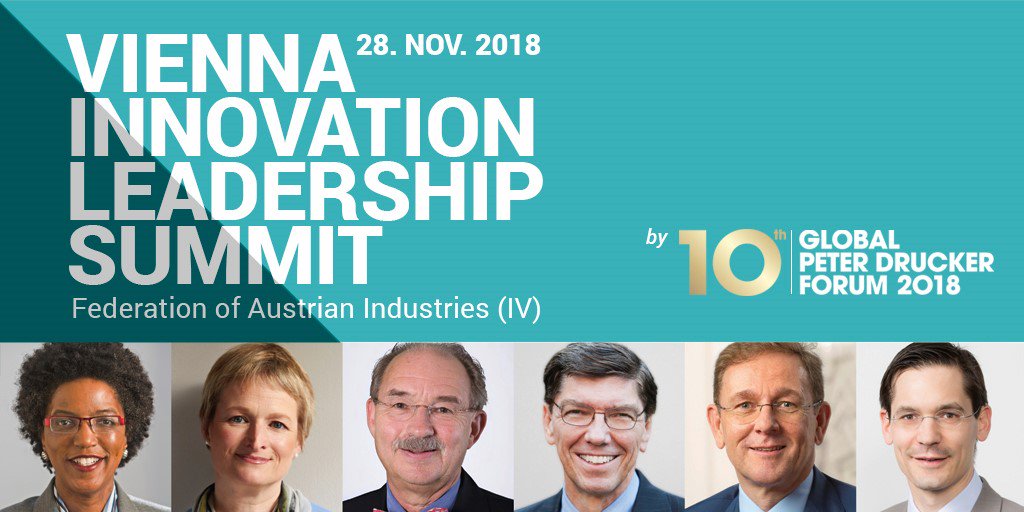|
The third stopover of my trip across Western Europe sees me in the beautiful city of Vienna, for the Global Peter Drucker Forum on 28–29 November. This year, the organisers expanded the programme to include a half-day 'innovation leadership summit' (summarised here) and an afternoon of round table and workshop sessions (more on that later). About 170 people gathered at the House of Industry, the headquarters of the Federation of Austrian Industries. The beautiful building was inaugurated by Franz Josef in 1911. The format of the summit was straightforward: three panel-based sessions—discussions that explored innovation from three perspectives. A lot of thought-provoking material was shared. Here's a few of the insights that stood out (for me, anyway): A new innovation landscape Julie Teigland, Regional Managing Partner of EY Germany, Switzerland and Austria, chaired the first session. Panel members included Curtis Carlson, Founder and CEO of The Practice of Innovation and former CEO of SRI (who developed SIRI); Rita McGrath, Professional at Columbia Business School; and Georg Kopetz, Co-founder of Executive Board TTTech. Insights: McGrath kicked off the discussion by asserted that strategy and innovation "go together". We can't talk. about one without also discussing the other. 'Digital' is a game-changer because it undermines many of the obstacles (barriers to entry) of market-based contracting. Barriers to entry and the ability to scale are undermined. With it, a fundamental shift, from firms to markets, is underway. Carlson picked up the discussion by asking whether entrepreneurship is the 'right' thing to be focused on. He noted that, since 1987, fewer than 20 per cent of startups have created any value at all. The problem is that entrepreneurs are pursuing two vital activities in the wrong order. The creation of value needs to precede entrepreneurship. When entrepreneurs focus first on value, then magic can, and often does, happen. Kopetz entered the discussion by asserting the 'born digital' means 'born global'. There is no option. If you are operating in the electronic world, sovereign borders are meaningless. However, scaling is tough; and collaboration is necessary. Interestingly, nearly all major innovations and step changes occur outside major companies, despite such companies being better resourced the most start-ups. Making innovation work Denise Kenyon-Rouvinez, Director of the IMD Global Family Business Center, chaired the second session. Panel members included Betsey Zeigler, CEO of 1871; Alex Osterwalder, Entrepreneur and Business Model Innovator; Yoshi Takashige, VP Marketing Strategy and Vision at Fujitsu; and Hal Gregersen, Executive Director of the MIT Leadership Center and MIT Sloan School of Management. Insights: Having set the scene in the first session, the purpose of this session was to 'talk dirty'. Innovation is most likely to occur when people crash into each other. When the do, they tell stories, share ideas and commit to dreams. The natural; outflow is an intelligent human-centric society; one that places people at the centre, not processes or things. Gregersen added that the 'digital economy' emerged, in effect, from the convergence of globalisation, innovation and transformation. Being new, all of these elements operate on the edge of uncertainty. Success (in terms of establishing capability) is dependent on leaders being happy to be wrong, create uncomfortable spaces and remain quiet as they listen carefully for weak signals. Yet somewhat paradoxically, isolation (quiet) is the enemy of innovation; and discovery depends on contact. CEO perspectives Linda Hill, Professor of Business Administration at Harvard Business School chaired the third session just before lunch. Panel members included Vineet Nayar, CEO of Sampark Foundation; Peter Oswald, CEO of Mondi Group; Gilbert Rühl, CEO of Klöckner & Co SE; and Helmut Reisinger, CEO of Orange Business Services. Insights: The purpose of this session was to listen to established chief executives as they offered coal-face insights about innovation, leadership and 'getting things done' in an increasing volatile world. A natural curiosity, combined with a well-developed propensity to both ask questions and listen carefully to answers, is crucial if the protagonistics are to be effective leaders. Standing back, this Summit created space for interactions between delegates and with the speaker panel. As such it provided a wonderful 'on ramp' to the main event, the Global Peter Drucker Forum, but more on that soon.
0 Comments
Leave a Reply. |
SearchMusingsThoughts on corporate governance, strategy and boardcraft; our place in the world; and other topics that catch my attention. Categories
All
Archives
May 2024
|
|
Dr. Peter Crow, CMInstD
|
© Copyright 2001-2024 | Terms of use & privacy
|


